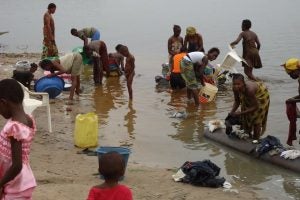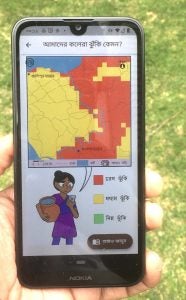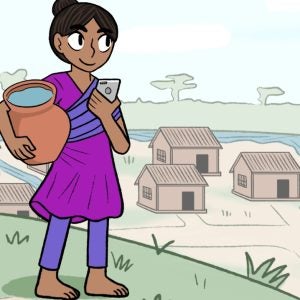URI’s Ali Akanda receives $600,000 to continue his work on Cholera
By Frances Butler
KINGSTON, R.I. – March 29, 2022 — Ali Akanda, Associate Professor at The University of Rhode Island and Antarpreet Jutla, Associate Professor at the University of Florida recently won a $600,000, three-year grant from NASA to help combat the spread of Cholera.
“Growing up on the Indian subcontinent made me acutely aware of the suffering caused by Cholera.” says Ali Akanda. “Along with my colleague Professor Jutla, I’m hoping we take make a real difference in reducing Cholera in my home country and worldwide.”
Cholera is an acute bacterial infection of intestine that happens when a person eats food or water contaminated with cholera bacteria. People with severe cholera can develop acute dehydration, which can lead to shock, coma, or even death within hours.
According to the World Health Organization (WHO), roughly 1.3 to 4 million cases of Cholera occur worldwide every year, with a resulting 21,000 to 143,000 deaths. But the WHO also warns that the actual number of cases is probably much, much higher, as many cases are never reported to formal health care organizations.
While Cholera is closely linked to inadequate access to clean water and sanitation facilities that have long existed in less-developed areas of our planet, increasingly, research is showing a new cause of infection. New cases because of political and social unrest and population displacement because of war or natural events are becoming more and more common.
Harnessing Big Data to Predict Cholera Outbreaks
NASA’s Earth Data Systems (ESDS) Program is a massive dataset of current and historical worldwide environmental variables such as water temperature, land surface temperature, water levels in lakes and streams, vegetation, elevation of snow caps, rainfall, and more. The information is gathered from a fleet public and private satellites.
Akanda and Jutla’s big idea is that these data can be used to track and predict how Cholera affects certain regions. “We see these markers…things that change in the environment before and after outbreaks.” says Akanda. “We hypothesize that we can use these data and develop an algorithm that will provide an ‘early warning’ for individuals, governments, and non-governmental organizations to take steps to avoid an epidemic.”

“We would like to take these data and calculate risk of Cholera in real-time for locations across the globe.” Says Akanda. “Often regions don’t know there is going to be a Cholera endemic until it hits.“
Along with the physical data from the ESDS data, Akanda is also using data marking socio-political situations in his calculations. “What is interesting is that we are finding that migration, war, famine, political uprisings can be additional triggers for outbreaks.” says Akanda. For example, Akanda’s research will be looking at areas of Eastern Africa and Yemen, where war and civil strife have been prevalent.
Getting the Word Out With a Phone App and Web Portal

Aside from knowing when a risk of Cholera is present, there must be the ability to get this information out. “We know that even in poorer regions of the globe most either have smart phones or are at least near someone who does.” says Akanda. “We are developing an application that people can download to be notified of increased risk of Cholera.” The app is installed on the phone, and allows the user, whether in the rural countryside or in the city, to “see” Cholera risks around them. “We’re trying to realize a system that will provide an early-warning for people in rural and poorer areas, where local health authorities may or may not know of the risk.” says Akanda.
The app was developed in collaboration with Sonia Aziz, associate professor of economics at Moravian University, Emily Pakhtigaian, assistant professor of public policy at Pennsylvania State University, and Kevin Boyle, a professor of agricultural and applied economics at Virginia Tech University.
Along with the smart phone application, Akanda and Jutla are also taking an inventory of governmental and non-governmental organizations such as ministries of health, news organizations, non-governmental organizations such as The Red Cross, The World Health Organization, and 50 other international agencies. “We’re building a web portal where these organizations can get real-time Cholera risks in different regions. “The idea is that these organizations can use their contacts, staff, and communications methods to reach everyone.” says Akanda.
A Passion for Good

What is clear in talking to Akanda that he is on a mission. Akanda says passionately that what has frustrated him is that Cholera is a preventable disease. “It doesn’t have to be this way.” he says. “As engineers we are charged with taking the basic sciences and providing solutions for humankind. We hope we will do just that.” “Cholera takes its toll on the poor and on the vulnerable. What drives us in our research is that we truly believe we are fighting the horrors of Cholera. That’s what drives us.”
Read more on URI Engineering research projects on clean water here.
This is a disease of inequity that affects the poorest and most vulnerable. It is unacceptable that nearly two decades into the 21st century, cholera continues to destroy livelihoods and cripple economies. We must act together. And we must act now.Dr. Tedros Adhanom Gebreysus, Director-General of WHO
